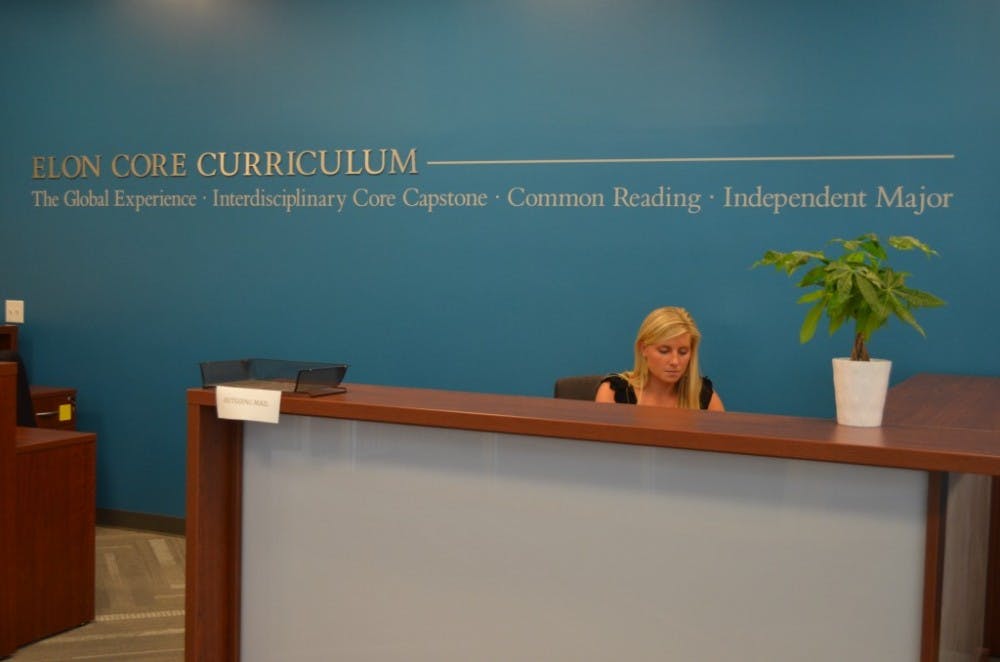An overhaul of general studies courses at Elon University has resulted in a new Core Corriculum, which will take effect this fall.
According to Jeffrey Coker, director of the Core Curriculum, the changes are mostly just in the name, but there are also some changes to the General Studies — GST -— seminar courses.
The new Core Curriculum offices in the Global Neighborhood will hopefully forge the way for interaction and integration, Coke said. He, plus 11 faculty members from different departments, will work in adjacent offices in order to promote interdisciplinary learning on campus.
The most obvious change for students is the title change for GST classes. Courses that previously had a GST prefix will instead have a COR prefix. For example, the Global Experience class required for first years will be COR 110 instead of GST 110. However, seminars and study aboard classes will retain the GST prefix for the 2014-2015 school year to prevent confusion for upperclassmen.
“With the titling change, students will instantly know what we’re talking about, the one core experience that everybody shares,” Coker said. “The term ‘general studies’ was more ambiguous.”
Elon’s title for freshman curriculum changed from “first-year core” to “first-year experiences” to prevent confusion.
Perhaps the most impactful change is in the structuring of upper-level GST courses, which are mandatory for all students.
Starting this semester, most courses will require a capstone project at the end of the course that is meant to bring together what students have learned in their experiences at Elon. Not all courses have added this component, but starting in the spring, they will be required to have it.
Junior Shelby Lewis, who is taking the upper-level GST “Prison Nation,” said a capstone project is a good idea.
“The idea in theory since it helps us to continue to keep up with what we’ve learned in different areas,” Lewis said. “If it is executed right, it’ll force you to think critially and retain all the information better than just a final exam.”
A more subtle change is the switch from “foreign languages” to “world languages.” This parallels the name change that came last year to the Department of World Languages and Cultures, formally the Department of Foreign Languages.
“Foreign language is traditional, but it has a negative connotation,” Coker said. “English is just one of the world languages, and this feels more of a how a global campus would talk about languages.”
After this year 200-level GST courses will be split into study abroad — STA — courses and interdisciplinary study —IDS — courses. The courses will formally switch names in the summer of 2015.
Coker said there were a variety of reasons for the changes this year, the primary one being the push to give students a more interdisciplinary experience at Elon.
“We are committed to providing the best education we can for students, and part of what drives that is going through a constant cycle of change and evaluation,” Coker said. “We want to try to get students more involved in different departments and making meaningful connections between majors.”
While the push to make students’ experiences more interdisciplinary has been slowly coming over the past few years, Coker said that it has blown up recently.
The Core Curriculum is designed to give students a shared experience no matter what they are studying.COR 110, a part of the first-year experience is set up so every section has the same themes and goals for students, no matter the professor.
“Faculty have different ways of getting across the message, but the point is the same in every class,” Coker said.
Later, taking their upper level COR class, go through the same thing they experienced in their first year. Each upper-level class is different, but they are all designed to get the same message of interdisciplinary learning across to students. As a way to connect the courses, the required capstone project gives students a chance to reflect on how their Elon experiences are all tied together.


